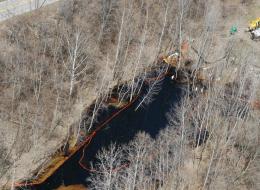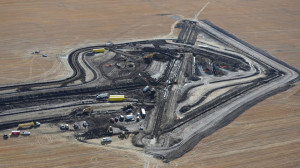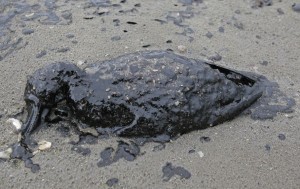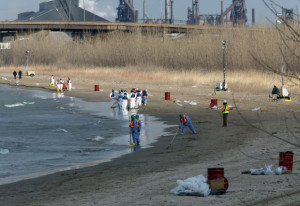How Many Oil Spills Will It Take?
Over the course of a little more than a week, here in the United States, over 222,775 gallons of oil have been spilled onto our land and into our water. A week.
Most of the narrative around oil condemns it for the amount of carbon dioxide it puts into the atmosphere, and its profound implications for climate change. Over the course of one week this month, four different oil spills have helped demonstrate why responsible citizens should stand against oil. While all the spills have tremendous consequences, each of the following cases reveals a unique threat that transporting this toxic substance has for our families and our environment.

Photo from Huffington Post
On March 17, just 20 miles north of Cincinnati, an oil leak was discovered when a motorist smelled something funny in the air and called the police. What was discovered was tragic – over 20,000 gallons of oil had leaked into the 374 acre Glen Oak Nature Preserve. It is still unclear when the leak started – without this concerned citizen, it is likely the spill would’ve gone on for days before anyone noticed.
The oil had come from a 5 inch crack in the Mid-Valley pipeline, which runs over 1,000 miles from Michigan to Texas. Despite the fact that the company that maintains the pipeline is unsure of the leak’s cause, less than a week after it was discovered, an impromptu clamp had been designed, approved by the federal government, installed and oil is once more flowing in the pipeline.

Photo from GREENPEACE
A few days later, on March 20, a gasket on a portion of above-ground pipeline in Alexander, North Dakota malfunctioned and spewed 34,000 gallons of crude oil onto the ground. While it appears that no water has been contaminated, North Dakota’s water quality director has warned that if a heavy spring rain comes, the oil could very well leach into nearby waterways.

Photo by Melissa Phillip, AP
Two days after the North Dakota leak, an oil carrier collided with a barge, spilling 168,000 gallons of oil into Galveston Bay, Texas. While it was fortunate that not all of the oil in the carrier escaped into the water, the timing of the spill couldn’t be worse as peak bird migration season approaches. When oil is in the water, these water-diving birds often die from ingesting the oil. What’s worse is that the oil spilled is a particularly heavy type of oil, meaning that, unlike gasoline spills, which can largely evaporate off the surface of the water, this oil will sink to the bottom of the Bay and can adversely affect the environment for years to come.

Finally, On March 25, eight days after the first oil spill in Ohio, a BP refinery in Whiting, Indiana spilled 755 gallons of oil into Lake Michigan. While this spill is relatively minor in comparison to the other spills, Lake Michigan serves as the drinking water source for Chicago and its suburbs – over 7 million people. Ingesting any oil at all is toxic, and the potential effects on humans are huge.
With so many other sensational stories dominating the airtime these days, it’s no wonder that many citizens are not aware that all of these spills happened. But note that in all these cases, until something bad happened, everything was running exactly as designed. The system with which we regulate and handle this toxic substance is broken, and the penalty for accidents is paid in permanent environmental damage, contaminated water, and human health.
It is crucial to remember as debates about oil rage on that oil is not just bad when burned – the processes to extract, transport and refine oil are toxic and dangerous on a global level and to local and regional communities.